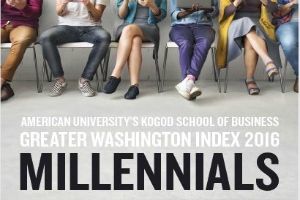Business
Millennial Index Advises DC Businesses

Credit: Kogod School of Business
Kogod’s Greater Washington Millennial Index isn’t just about research. It’s about perception. “How consumers – in this case, Millennials – see things drives reality,” says Dawn Leijon, head report researcher and Kogod Executive-in-Residence. “Understanding this reality tells us how to satisfy them.”
Leijon, a veteran of the consumer marketing industry, believes this is critical to a strong economy in Washington, DC. As the fastest growing employee segment in the US economy—one that’s projected to make up 50% of the workforce by 2020—Millennials are, quite literally, the future.
That makes examining their needs as consumers and employees not just important, but essential.
This fact was Leijon’s motivation for spearheading the report. First released in 2016, with its second edition in 2017, the Millennial Index measures the group’s satisfaction with living in the DC metro area. The report aims to inform businesses about what satisfies Millennials. “If employers don’t know what Millennials want, they won’t be able to retain them. This could be a huge problem, since not only is this group the largest part of our workforce, but is also one of the most innovative,” Leijon says.
So, what do Millennials want? Bars, restaurants and a vibrant nightlife? The report found this stereotype is a huge misnomer. Millennials actually want very traditional things—a decent salary, healthcare, a 401K. The “Millennial as a job-hopping partier” is a matter of age, rather than generation.
“When you’re in your early 20s, your priorities are different than when you’re in your late 20s or early 30s,” Leijon explains. “We found that Millennials are generally regular ‘working stiffs.’”
Offering a competitive salary and benefits package is more difficult than one might think, however. Washington DC’s high cost of housing—currently 2.3 times the national average—poses a serious challenge. The DC area’s salaries compared to its cost of rent, goods and services, aren’t that much higher than other large US metropolitan areas.
Leijon thinks DC businesses need to get creative. What, other than money, can they offer?
The Index shows that Millennials are also interested in non-traditional benefits, such as extended paternity leave, home ownership savings accounts and sabbaticals. Supplementing incomes with additional high-value benefits could increase a company’s employment appeal, helping attract and retain more Millennials over time.
The DC area’s long commute is also a cause for concern. “Only New Yorkers surpass us in time spent getting to and from work, and that’s just a matter of minutes,” Leijon says.
According to the report’s data, 60 percent of Millennials are driving to work “often or always.” They aren’t happy about it, either—80 percent agree that “traffic in the DC area is horrendous.”
Lejion notes this is only partially due to the DC area’s large population. She also attributes the heavy traffic—and dreaded commutes—to many companies’ suburban locations. “There are a lot of job centers in the suburbs, so people have to travel further for longer,” she says. “And they have to drive because Metro stations are few and far between outside the city.”
Whatever the cause of the area’s lengthy commutes, one fact is certain: businesses need to address it. Remote work schedules, coordinated ride shares, metro benefits—Millennials indicated these industry standard solutions are priorities when considering a job.
Leijon is happy she helped bring a business perspective to the Index’s economic research. The report is the first of its kind to do so, framing the data through the eyes of a business owner rather than an economist. “We brought industry thinking into the policy world, giving companies actionable insights they can use immediately.”
Her research will not stop with the 2016 report. She plans to write a third report set for release in early 2018. The updated research will help her track trends in data, painting a clearer picture of Millennial’s needs over time. “Consistent annual tracking shows whether we’re heading in the right direction, and it surfaces evolving needs and attitudes,” she says.
The Millennial Index, while certainly about perception, is also about impact. The report helps business owners think ahead, encouraging them to address what their current and future workforce needs. Addressing DC Millennials’ needs is an investment in the city’s future, which makes this “incredibly valuable research,” says Leijon. “I feel confident the Index will serve the DC business community for years to come.”
For more information about the 2016 Greater Washington Index, click here. Read the full report by clicking here.

